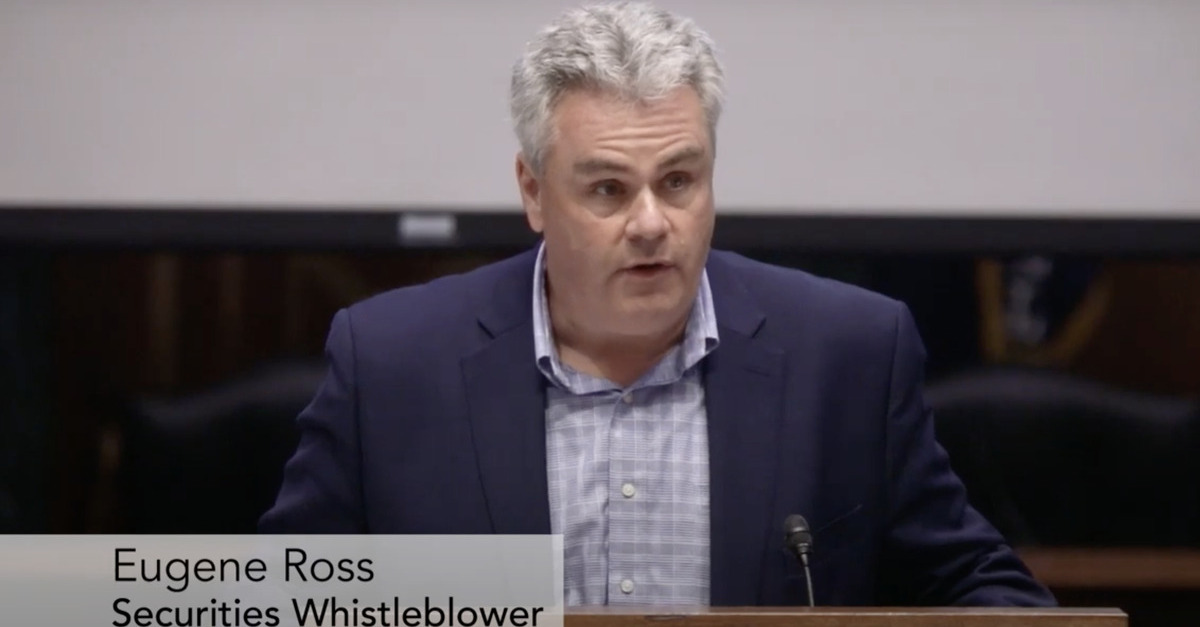
Eugene Ross speaks at the National Whistleblower Day 2019 celebration.
A federal appeals court ruled Friday against a whistleblower whose information helped the Securities and Exchange Commission (SEC) win both a criminal conviction and a multi-million dollar civil verdict against an investment broker that defrauded its customers.
Eugene Ross was a broker with the now-defunct investment firm Bear Stearns. Ross uncovered a massive fraud scheme in 2004 involving Amerindo Investment Advisors, Inc., which led to a successful SEC prosecution for misappropriation of over $5 million in investor funds. During the prosecution, Ross testified for the Department of Justice at the trial, and provided an internal memo that documented the fraud.
In the months immediately following Ross’s report of the fraud, Bear Stearns cut Ross’s pay by 30-percent, withheld commissions, and took steps to prevent Ross from opening new accounts.
The timeline following Ross’s disclosure to the SEC lies at the heart of Ross’s failed whistleblower claim.
Two Amerindo executives were convicted of fraud in 2008. Thereafter, the SEC pursued a civil action against the perpetrators. The Dodd–Frank Wall Street Reform and Consumer Protection Act (Dodd-Frank) became law in 2010 and created an overhaul of U.S. financial regulations as well as robust protections for industry whistleblowers.
In 2011, Ross submitted formal whistleblower disclosures to the SEC, in which he specifically incorporated his pre-Dodd-Frank statements to the SEC. In 2014, the trial court entered judgment in the civil case in favor of the SEC, and ordered Amerindo and the individual defendants to pay approximately $100 million in disgorgement, prejudgment interest and civil penalties. Once the civil trial had completed, the SEC invited claimants to file whistleblower award applications.
Ross, whose disclosures had sparked the Amerindo case, filed a whistleblower award application. That application was denied by the SEC denied on the grounds that the information Ross provided failed to meet three statutory criteria for whistleblower compensation. The agency found that Ross’s disclosures were not made “voluntarily” in that they had not been submitted until after Ross received a government request, that they did not constitute “original information,” because Ross submitted them before Dodd-Frank was enacted in 2010, and because Ross’s information “did not lead to” the SEC’s successful enforcement action. The SEC reasoned that allowing Ross to collect whistleblower benefits would conflict with Dodd-Frank’s purpose of incentivizing whistleblowers to come forward on their own before authorities “come knocking on the door.”
Ross appealed the SEC’s order, and the U.S. Court of Appeals for the District of Columbia Circuit sided with the SEC. Judge Karen Lecraft Henderson (a George H.W. Bush appointee) wrote for the panel, which also included Judge Judith Rogers (a Bill Clinton appointee), and Judge Robert Wilkins, who was appointed by Barack Obama.
Judge Henderson wrote for the panel, which based its decision on the “original information” aspect of the statutory requirements. Henderson explained, that “a claimant’s failure to satisfy any one of these statutory requirements dooms his whistleblower award application.”
In a 13-page opinion, Henderson recounted the facts and determined that Ross’s application was indeed doomed in that it failed to constitute “original information.” Thus, there was no need to analyze the other two bases for the SEC’s denial.
Henderson acknowledged in a footnote that it is undisputed that the information in question originated with Ross. However, the judge reasoned, the applicable SEC regulation “expressly excludes information submitted before July 21, 2010,” thus making it “crystal clear that the Commission, in crafting its implementing regulations, must exclude” Ross’ submissions from the definition of “original information.” Henderson pointed out in a footnote that the statutory restriction on timing “was no accident, given that [Congress] knew how to provide for retrospective application where it wanted to.”
The SEC’s denial of Ross’s whistleblower application has been the subject of much criticism.
In a 2020 piece on Ross in Whistleblower Network News, Geoff Schweller writes, “The story of whistleblower Eugene Ross serves as a sobering reminder of the personal hardships that can befall whistleblowers in the absence of strong whistleblower protections.” Likewise, in a 2021 Institutional Investor piece, Leah McGrath Goodman calls the outcome “a neat legal stitch-up” in which the SEC “cleverly rests on the notion that any information provided before Dodd-Frank, whatever its quality, arrived too soon, while any information coming after Dodd-Frank’s enactment did not win the case.”
Read the opinion below:
[screengrab via YouTube]